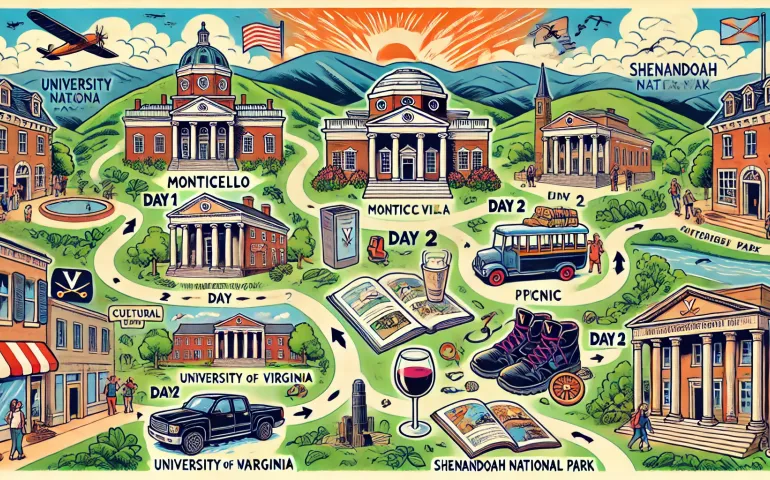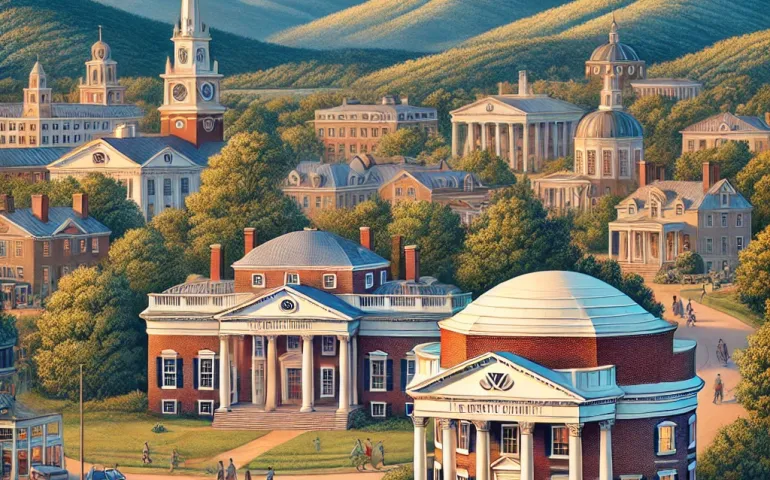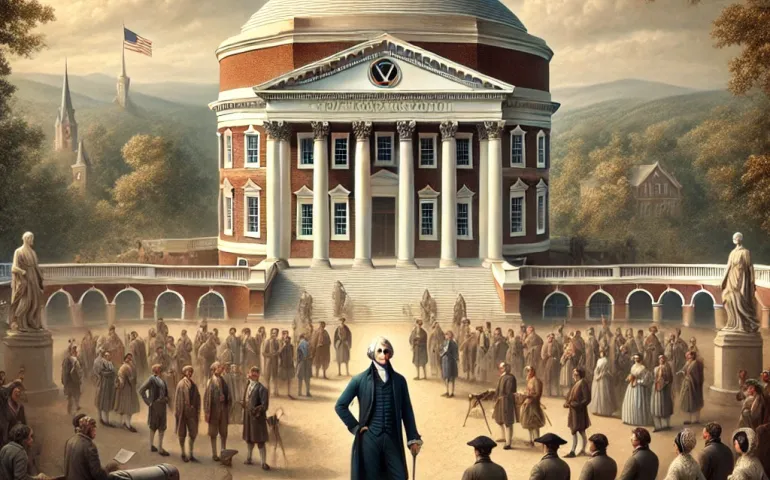About Place
- Charlottesville is a "charming Southern town" known for its deep sense of history and vibrant cultural life.
- It is home to the University of Virginia, founded by Thomas Jefferson, who also lived nearby at Monticello, his architectural masterpiece and plantation.
- The city is characterized by historic buildings, tree-lined streets, and a strong sense of community.
Reasons to Visit
- Historic Significance : Charlottesville is steeped in American history, being the home of Thomas Jefferson, one of the Founding Fathers. Visitors can explore Monticello, a UNESCO World Heritage Site, and the beautifully preserved University of Virginia campus, both of which reflect Jefferson’s architectural genius and vision.
- Natural Beauty : The city is surrounded by the rolling hills of the Blue Ridge Mountains, offering breathtaking landscapes and a plethora of outdoor activities. Shenandoah National Park is a short drive away, providing opportunities for hiking, camping, and scenic drives along the Skyline Drive.
- Vibrant Arts and Culture : Charlottesville boasts a lively arts scene, with numerous galleries, theaters, and live music venues. The Downtown Mall, one of the longest pedestrian malls in the U.S., is a hub of activity, with a variety of shops, restaurants, and entertainment options.
Visa
- U.S. Citizens : No visa required.
- Canadian Citizens : No visa required for short visits.
- European Union Citizens : Visa-free travel for up to 90 days under the Visa Waiver Program (ESTA required).
- Citizens from Other Countries : May require a visa depending on the country of origin. It's advisable to check with the U.S. Embassy or Consulate for specific requirements.
Travel Expenses
- Travel to & from Charlottesville :
- Flight: Round-trip flights from major cities like New York or Washington, D.C., to Charlottesville Albemarle Airport (CHO) typically range from $200 to $400 per person.
- Total for Two : $400 - $800.
- Hotel Cost :
- Average Hotel Rate : $150 - $300 per night for a mid-range hotel.
- Total for 3 Nights : $450 - $900.
- Food Cost :
- Average Meal Cost : $20 - $40 per person for lunch, $40 - $70 per person for dinner.
- Total for 6 Meals (2 people) : $360 - $660.
- Activity Cost :
- Monticello Admission : $30 per person.
- Shenandoah National Park Entrance Fee : $30 per vehicle.
- Total for Two : $90.
- Near Destination Travel Cost :
- Car Rental : $50 - $100 per day.
- Total for 3 Days : $150 - $300.
Total Estimated Travel Expenses for Two : $1,450 - $2,750.

Best Itinerary
Day 1 : Exploring Jefferson's Legacy Begin your day with a visit to Monticello, the former plantation and home of Thomas Jefferson. Start early around 9:00 AM to avoid crowds and spend the morning exploring the house, gardens, and Jefferson’s extensive library. Afterward, head to the historic Michie Tavern for a traditional Southern lunch around 1:00 PM. In the afternoon, explore the University of Virginia campus, particularly the Rotunda and Lawn, finishing up by 5:00 PM. For dinner, enjoy farm-to-table cuisine at The Ivy Inn, a local favorite, and spend the evening strolling along the Downtown Mall, catching live music at the Jefferson Theater.
Day 2 : Embracing Nature Set off early for a scenic drive along Skyline Drive in Shenandoah National Park. Arrive by 8:00 AM to catch the morning light. Spend the day hiking some of the park’s famous trails, such as Old Rag or Hawksbill Mountain, which offer stunning views. Pack a picnic lunch to enjoy at one of the scenic overlooks. Return to Charlottesville by late afternoon and dine at Mas Tapas, a popular spot for Spanish-inspired small plates. If you're up for it, visit one of the nearby vineyards or breweries for a nightcap and enjoy the serene countryside atmosphere.
Day 3 : Art and Culture Start your day with breakfast at Bodo’s Bagels, a local institution. Then, explore the Fralin Museum of Art on the University of Virginia campus, which houses a diverse collection of art from around the world. Spend the afternoon visiting local galleries along the Downtown Mall or take a short drive to the Kluge-Ruhe Aboriginal Art Collection. For lunch, try the C&O Restaurant, known for its creative American cuisine. In the evening, catch a play or performance at the historic Paramount Theater, and cap off your trip with dinner at the elegant Fleurie Restaurant, which offers French-inspired dishes.

Safety Tips
- Keep personal belongings secure in public places.
- Be aware of your surroundings, especially when walking at night.
- Follow local traffic laws and drive cautiously.
- Stay hydrated, particularly when hiking.
- Keep your phone charged and have a local map.
- Respect wildlife and follow park regulations in natural areas.
- Use licensed taxis or rideshares.
- Keep a copy of important documents in a separate location.
- Be mindful of weather conditions, especially in the mountains.
- Avoid leaving valuables in your car.
Flights
- Look for direct flights to Charlottesville Albemarle Airport (CHO) from major cities. United Airlines and American Airlines often provide routes.
Hotels
- The Clifton Inn : A luxurious historic inn just outside the city.
- Oakhurst Inn : Boutique hotel near the University of Virginia.
- Graduate Charlottesville : Trendy hotel with a rooftop bar.
- Residence Inn by Marriott : Comfortable, extended stay hotel.
- The Draftsman, Autograph Collection : Stylish hotel in a central location.
Contacts
- Indian Embassy (Washington, D.C.) : +1 202-939-7000
- Local Emergency Number (Police, Ambulance, Firefighters) : 911
- Charlottesville Police Department: +1 434-970-3280
Country
Closet Airport
- Charlottesville Albemarle Airport (CHO)
Nearest City
- Washington
- D.C.
Heritage Sites
- Monticello (UNESCO World Heritage Site)
Airlines
- American Airlines
- United Airlines
- Delta
Currency
- U.S. Dollar (USD)
Languages Spoken
- English
Real Story
One of the most significant historical events associated with Charlottesville is the founding of the University of Virginia by Thomas Jefferson in 1819. This was not just an educational endeavor but a bold experiment in the very concept of higher learning and democracy. Jefferson envisioned the University as a place where free and independent thought would flourish, unbound by religious or political control—a radical idea at the time.
The Birth of the University of Virginia : In the early 19th century, higher education in America was largely controlled by religious institutions, and the curriculum was often narrowly focused on classical studies. Thomas Jefferson, having spent years in public service and deeply influenced by the Enlightenment, wanted to create a university that would prepare leaders for a new democratic republic. His vision was of a secular institution, grounded in the liberal arts, but also advancing knowledge in the sciences, law, and other practical fields.
Jefferson meticulously designed the campus, known as the Academical Village, with the Rotunda at its center—a symbol of the "authority of nature and power of reason." The architecture was inspired by the Pantheon in Rome, embodying Jefferson’s belief in the power of knowledge and the public good. The surrounding pavilions, where professors lived and taught, were connected by colonnades, reflecting the idea of a connected and harmonious academic community.
The university officially opened in 1825 with an initial enrollment of 123 students and a faculty of eight. From its inception, it stood out as a revolutionary institution: students were free to choose their courses of study, which was a departure from the rigid, prescribed curriculums of the time. The University of Virginia became a model for the modern American university system.
Slavery and Paradox : However, Jefferson's grand vision was not without its contradictions. While advocating for education and enlightenment, Jefferson, and indeed the university itself, relied heavily on enslaved labor. The construction of the university and its early operations were carried out by enslaved people. This paradox is a significant part of Charlottesville's history and is a subject of ongoing reflection and reckoning.
Today, the University of Virginia acknowledges this aspect of its past and has undertaken numerous efforts to memorialize the contributions and lives of the enslaved people who built and maintained the university. The Memorial to Enslaved Laborers, completed in 2020, is a powerful symbol of this commitment, standing as a reminder of the complexities and contradictions in the legacy of one of America's most revered Founding Fathers.
Legacy and Impact : The University of Virginia remains one of the most prestigious public universities in the United States, embodying Jefferson’s ideals of academic excellence, intellectual freedom, and public service. Its historical significance, combined with its continuous evolution as a modern educational institution, makes it a central element of Charlottesville’s identity.
The story of the University of Virginia is not just a chapter in the history of American education but a reflection of the broader American experience—marked by visionary ideas, deep contradictions, and the ongoing struggle to align principles with practice.
Cuisine
Charlottesville’s culinary scene is a delightful blend of Southern traditions, local ingredients, and international influences, making it a vibrant food destination.
Southern Comfort and Farm-to-Table Dining: The region’s rich agricultural heritage plays a significant role in its cuisine. Many restaurants in Charlottesville are dedicated to the farm-to-table movement, sourcing ingredients from nearby farms to create dishes that highlight the freshness and quality of local produce. Seasonal vegetables, grass-fed meats, and artisanal cheeses are staples in many kitchens.
A quintessential dish to try in Charlottesville is fried chicken, often served with collard greens, mashed potatoes, and gravy. The crispy, golden exterior and tender, juicy meat make it a comfort food favorite. You might find variations that include a touch of heat, like hot chicken, or paired with local honey for a sweet-savory combination.
Barbecue : Another Southern staple, barbecue in Charlottesville reflects the region’s love for slow-cooked, smoky meats. Pulled pork, smoked brisket, and ribs are popular options, typically served with tangy vinegar-based sauces that are common in Virginia. These dishes are often accompanied by classic sides like coleslaw, baked beans, and cornbread.
Local Wine and Cider : Charlottesville is also at the heart of Virginia wine country. The climate here is particularly well-suited for growing Viognier, the state’s signature grape, known for its aromatic qualities and flavors of stone fruits and floral notes. Visiting one of the many local vineyards, such as Jefferson Vineyards or Barboursville Vineyards, provides an opportunity to sample these wines in a beautiful countryside setting.
In addition to wine, Virginia’s apple orchards produce excellent hard cider, a traditional drink that has seen a resurgence in recent years. Cider houses in the area offer a variety of styles, from dry and crisp to sweet and fruity, often made from heirloom apple varieties.
International Flavors : Charlottesville’s food scene is not limited to Southern cuisine. The city’s diverse population and its role as a university town have brought a variety of international flavors to the area. You can find authentic Mexican, Indian, Thai, and Middle Eastern food, among other cuisines. This diversity makes it easy to enjoy a wide range of culinary experiences, from a cozy Southern diner to an elegant French bistro.
Local Favorites : No visit to Charlottesville is complete without trying a bagel from Bodo’s Bagels, a beloved local chain known for its fresh, hand-rolled bagels and a variety of creative toppings. Another must-try is the Pippin Hill Farm & Vineyards, where you can enjoy a meal made with local ingredients paired with their wines, all while taking in panoramic views of the Blue Ridge Mountains.
Charlottesville’s cuisine is a reflection of its landscape and its people—rich in tradition, yet always evolving, offering visitors a true taste of the region’s bounty and creativity.

Culture and History
Charlottesville’s culture is a rich tapestry woven from its historical roots, academic influence, and artistic community. The city reflects the intellectual legacy of Thomas Jefferson, whose ideas about education, architecture, and governance still permeate the area. The University of Virginia, with its neoclassical design, is a focal point of academic and cultural life, drawing scholars, students, and visitors from around the world.
The local arts scene is vibrant, with numerous festivals, galleries, and live performances. The Virginia Film Festival, hosted annually, is a highlight, attracting filmmakers and cinephiles. The city’s music scene is diverse, from the historic Paramount Theater to smaller venues like The Southern, showcasing everything from classical to indie rock.
Charlottesville’s history is also intertwined with the complex narrative of the American South. Sites like Monticello and the nearby Ash Lawn-Highland (home of James Monroe) offer a window into the lives of the Founding Fathers, while also confronting the realities of slavery. The city's dedication to preserving its history while fostering an inclusive, forward-looking community is evident in its many cultural institutions.
